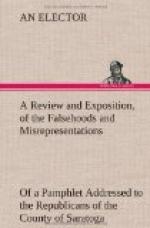Have Englishmen in less than two generations substituted love for the hate that Napier, Wellington, and the Queen’s Ministers felt and expressed in 1846 for the people of the United States? Is it love to-day for America or fear of someone else that impels to the “Arbitration Treaties” and the celebration of the “Hundred years of Peace?”
The Anglo-American “Peace Movement” was to be but the first stage in an “Anglo-Saxon Alliance,” intended to limit and restrict all further world changes, outside of certain prescribed continental limits, to these two peoples alone on the basis of a new “Holy Alliance,” whose motto should be Beati possidentes.
Since England and America, either in fact or by reservation enjoy almost all the desirable regions of the earth, why not bring about a universal agreement to keep everyone in his right place, to stay “just as we are,” and to kindly refer all possible differences to an “International Tribunal?”
Once again the British Bible was thrown into the scale, and the unrighteousness of Germany, who did not see her way to join in the psalm singing, was exposed in a spirit of bitter resignation and castigated with an appropriate selection of texts. The Hague Tribunal would be so much nicer than a war of armaments! With no reckless rivalries and military expenditure there could be no question of the future of mankind.
An idyllic peace would settle down upon the nations, contentedly possessing each in its own share of the good things of life, and no questionable ambitions would be allowed to disturb the buying and selling of the smaller and weaker peoples. The sincerity of the wish for universal arbitration can be best shown by England, when she, or any of the Powers to whom she appeals, will consent to submit the claim of one of the minor peoples she or they hold in subjection to the Hague Tribunal. Let France submit Madagascar and Siam, or her latest victim, Morocco, to the franchise of the Court. Let Russia agree to Poland or Finland seeking the verdict of this bench of appeal. Let England plead her case before the same high moral tribunal and allow Ireland, Egypt, or India to have the law of her. Then, and not until then, the world of little States and beaten peoples may begin to believe that the Peace Crusade has some foundations in honour and honesty—but not till then.
Germany has had the straightforwardness and manliness to protest that she is still able to do her own shooting and that what she holds she will keep, by force if need be, and what she wants she will, in her own sure time, take, and by force too, if need be. Of the two cults the latter is the simpler, sincerer, and certainly the less dishonest.




